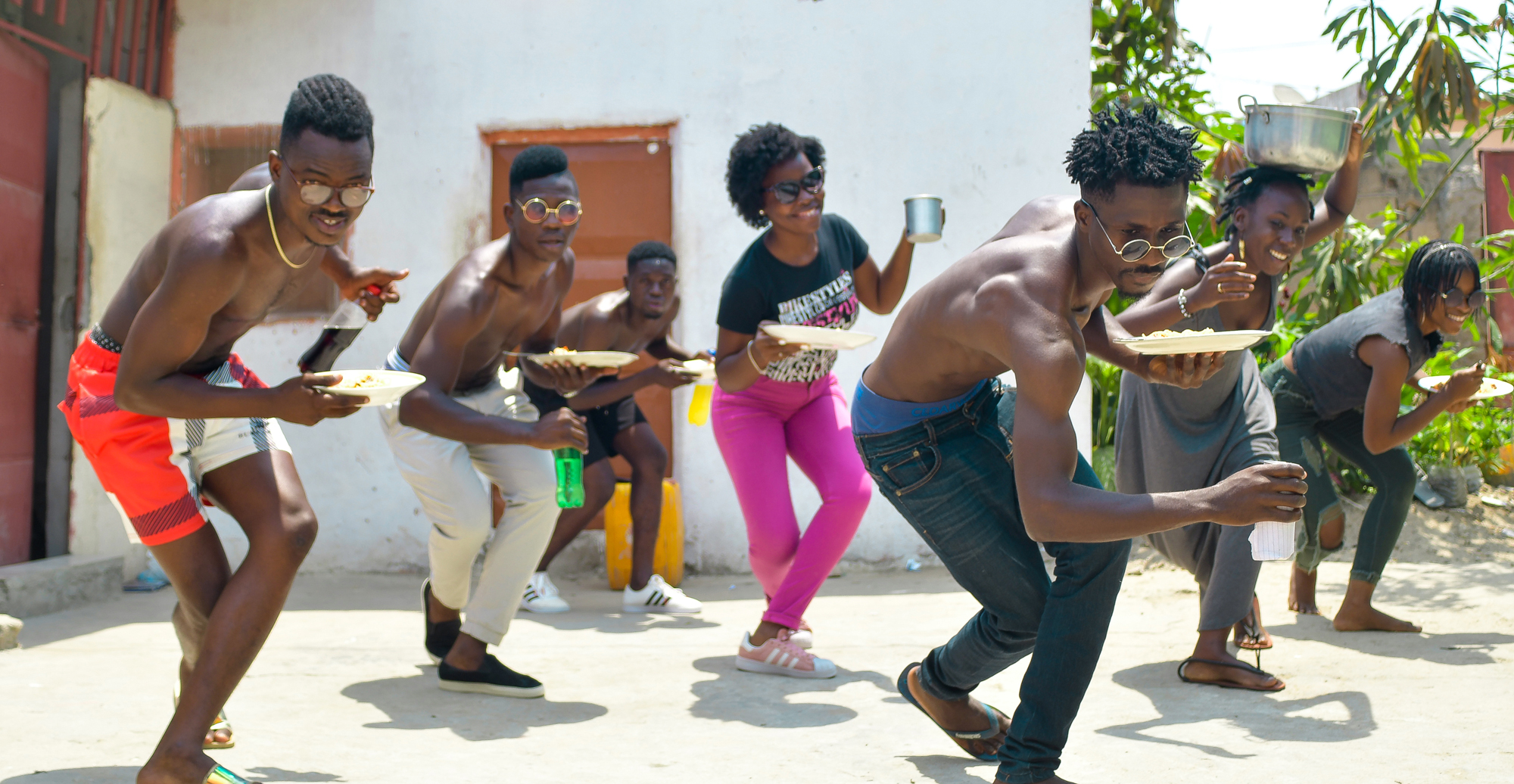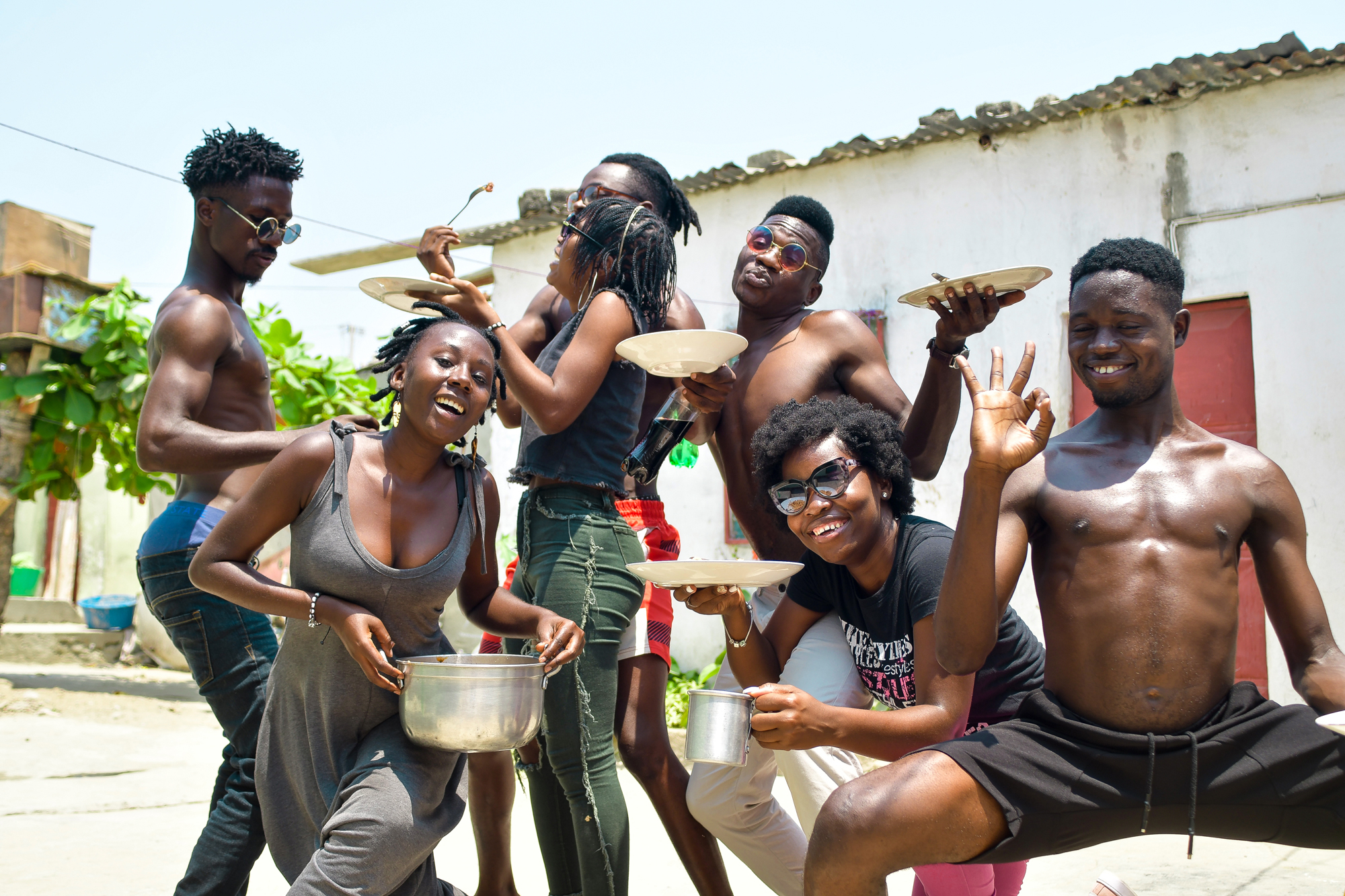The #Jerusalemadancechallenge will enter history as the global COVID-19 crisis’ unprecedented, contemporary African-inspired symbol of hope. Yet the Angolan origins of this viral trend, and the reason behind Jerusalema’s explosive popularity, are barely touched upon by the international media.
In February 2020, Os Fenómenos do Semba [The Semba Phenomena] posted a video under the hashtag #jerusalemadancechallenge. I remember the mix of intense joy and longing I felt listening to Jerusalema’s poignant vocals, the emotional impact of which was further intensified by the dancers’ catchy, sensual, nonchalant choreography performed in a typical Luanda backyard. There was an immediate urge to share the video with others, reinforced by the fact that during my eight years in Angola, I’d gotten to know some of the dancers well.
Soon, social media videos began to emerge of fans in Europe and Brazil copying Os Fenómenos’ choreography in their living rooms, during the first COVID-19 lockdowns. It was the beginning of an African-inspired global dance craze, the scale and likes of which the world has never seen.
By now, it’s hard to keep up to date on who’s participating and where. We’ve already seen Kenyan MP’s, the Zanu PF Youth League in Zimbabwe, Italian and French nuns and priests, Palestinians in the occupied Eastern part of Jerusalem, South African and Belgian hospital staff, wildlife services in Kenya and Zimbabwe, an entire South African film crew, hospitals, an Airlink flight crew, Italian marines, Cape Town’s High Court and Romanian fire fighters perform the choreography online. Janet Jackson has endorsed the original #jerusalemadancechallenge on her Instagram page; South African President Cyril Ramaphosa in September called on South Africans to join the dance challenge, saying ‘There can be no better celebration of our South African-ness’. The list goes on.
Master KG and vocalist Nomcebo Zikode’s upbeat Zulu-language track with spiritual undertones has been streamed around a hundred million times on Spotify. It was a number one Spotify hit this year in the Netherlands, Luxembourg, Portugal, Belgium, South Africa, Spain, Romania and Switzerland, and the most searched-for song globally on music identification app Shazam. Os Fenómenos do Semba’s original #jerusalemadancechallenge video has more than 13 million views on YouTube, while Jerusalema’s official music video has 218 million. That does not include the countless videos posted on YouTube under the #jerusalemadancechallenge hashtag. On TikTok, #Jerusalema has hundreds of millions of views. So does #JerusalemaDancechallenge.
COVID-19’s second wave is seeing global news outlets and even some academics starting to pay tribute to Jerusalema and the accompanying dance challenge. But the Angolans who catapulted Jerusalema to the global stage deserve much more than just a mention and a few quotes in passing.
Who are Os Fenómenos do Semba?
On 12 february 2015, thirteen years after the end of Angola’s devastating civil war (1975 - 2002), four young Angolans aged 18 to 23 from Luanda’s Martires and Cassenda slums form a dance group called Os Fenómenos do Semba. They specialize in Semba, Kizomba, traditional Angolan dance, Afro House and Kuduro.
Their slogan: ‘O que Deus dá, ninguém tira - ‘What God gives, no one takes away’ – is a continuation of the mantra they used in their former dance group, União Clásico do Semba, formed when youngest member Telma André was only twelve.
Adilson Maíza (20) and Jone Valentino (23), are brothers and best friends. The girls, Nelinha Gonga (21) and Telma André (18) are sisters. Adilson and Telma were already in love at the time of Os Fenómenos do Semba’s creation. In 2017, Jone and Nelinha fall in love too. Both couples are still together to this day.
Os Fenomenos are exceptionally talented and work exceptionally hard. Their six hours of daily training doesn’t include time spent on teaching or performing at weddings, and eventually Angolan national TV. It is during this time that Semba and Kizomba, two of the dances Os Fenómenos specialize and excel in, begin to take the world by storm.
In April 2017, after a dazzling televised performance, Jone and Nelinha win Angola’s annual National Semba and Kizomba Competition. They now work for several dance schools in Lisbon (Portugal), where they live together. The couple also teach and perform at festivals in Holland, France and Italy.
Despite being at the very least equally talented, Adilson and Telma end second and third in Angola’s National Semba and Kizomba Competition in 2016 and 2017.
Through their social media and networking skills, they fulfil their international ambitions independently, and on their own terms. In 2018 and 2019, they teach and perform at dance festivals and competitions in Brazil, France, Switzerland, Finland, Belgium, Poland, Sweden, Norway and Germany; all by invitation.
Then suddenly, with their #jerusalemadancechallenge in February 2020, global fame catches Os Fenómenos do Semba unawares.

Five-year Anniversary
#Jerusalemadancechallenge was born exactly five years after Os Fenómenos do Semba’s birth. ‘We got together to celebrate our five-year anniversary on 12 February 2020,’ Adilson Maíza (25) the group’s most prolific dancer, tells ZAM Magazine.
‘The girls decided to cook cachupa, [a typical Cape Verdean dish made of beans, corn, meat and other ingredients]. The guys bought [non-alcoholic] drinks.’
Spontaneously, and still eating, they created a choreography to the rhythm of Jerusalema, candidly projecting Angolan’s intimate relationship between music, dance and ordinary daily activities.
Domino effect
Jerusalema started off as a local hit in South Africa at the end of 2019. Its popularity was only slowly starting to cross borders when in February 2020, the Angolan #jerusalemadancechallenge video gave the song a ground-breaking global lease of life.
In an interview with the South African newspaper The Sowetan in July 2020, Master KG himself admits that the original Angolan #jerusalemadancechallenge video catapulted his track to global fame.
‘I’d say the first one [#jerusalemadancechallenge] that was done in Angola remains my favourite, because it gave birth to all the dance challenges all over the world,’ the website quotes him as saying. ‘It is a dance that was done by people from Angola. Then Portugal followed, and it just went viral from that point.’
Black Atlantic Fusion
The choreography’s roots are topic of discussion. Adilson Maíza tells ZAM Magazine that group member Pires Kizomba picked up dance steps in South Africa, which they mixed with influences from Angola’s dança da familia, a group choreography popular in the 1990’s and early 2000’s.
‘We tweaked the original to create something more beautiful,’ he says. In Angola, this is a process of fierce, proud competition, a social game in which Angolan dancers constantly push themselves to be the most original and creative.
Dança da familia is a hybrid dance, influenced back and forth across the ‘Black Atlantic’, according to Dr. Stefanie Alisch, chair of Popular Music Studies at Humboldt University Berlin who obtained her PHD with a pioneering study on Angolan electronic dance music, Kuduro. ‘Not only are Angolans expert dancers; they are also experts at blending outside influences together and rightfully claiming the result for themselves,’ she tells ZAM Magazine.
Maserati
Extravagantly stylish Adilson Maíza recently posted photos of his first car on Facebook. It’s a little white second-hand car, paint-sprayed with the word ‘Maserati’ in huge black dragon letters, for a laugh. ‘I won’t say our lives have changed,’ he says during a video group interview. ‘They have improved. But we all still dream of owning our own house, and above all: of graduating.’
The dancers belong to the majority of Angolans whose families lack access to decent healthcare, quality education and good basic living standards. A staggering 68 percent of Angolans are illiterate. In 2014, only 2.6 percent of Angolans older than 25 had attained a bachelor’s degree or equivalent. Lack of access to education is Angola’s largest contributor to poverty, followed by poor nutrition. At the same time, Angola’s population of 32 million is among the top five youngest and fastest-growing populations in the world. Everyone who has been in Angola long enough can attest to the fact that the country is bursting with potential, pride, energy and creativity.
Os Fenómenos are all university students. Clinical Psychology graduate and group member Bilson Negrine has already financed his entire study through dancing. The others are following, or plan to follow in his footsteps.
‘In Angola, dance is the quickest way of achieving growth,’ Maíza explains. It’s a vehicle that can help you reach your dream destination.’
Reshaping the African Narrative
Master KG follows the group’s social media pages, and there have been some messages back and forth. But rather than recognising joint potential and seeking collaboration, he has thus far shown a reserved attitude towards the group. Yet he and Os Fenómenos do Semba find themselves firmly in the middle of academic analyses on their joint role in reshaping the African narrative.
Executive director of Africa no Filter, Nigerian-born Moky Makura comments on #jerusalemadancechallenge in Okay Africa: ‘Don't forget this is the continent that gave the world many firsts… Although we don't really know the perfect storm of ingredients that trigger global trends, Jerusalema unexpectedly captured the global zeitgeist.’
Referring indirectly to both Master KG and Os Fenómenos do Semba, she writes, ‘The song and the dance have provided inspiration for this continent and set the bar for what is possible when we unleash our creativity unfiltered.’
Besides teaching their choreography online to groups from all corners of the world, Os Fenómenos do Semba have recently been invited to dance in Nigerian and American musicians’ video clips. Even more impressive is Angola’s living legend Matias Damasio’s invitation to perform in the video clip of his new track ‘Ta doce [It’s sweet], which they’re working on right now.
Rewriting history
Os Fenómenos do Semba would not be where they are now without participating in globalization through the use of smartphones and new technology, Maíza underlines, making a crucial point.
After the global COVID-19 crisis is over, Os Fenómenos do Semba will have the world at their feet. And they have no one to thank for their success but themselves.
Lula Ahrens is a Dutch freelance journalist who lived in Angola’s capital Luanda from 2010 to 2018. During that time, she was a regular contributor to Forbes Africa, Radio Netherlands Worldwide, This is Africa and AP.


